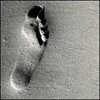Winslow Homer
R. Griffin
In this exciting new monograph, Professor Griffin provides fresh insight into the life and work of one of America's most-famous and best-loved artists. The author places Homer against a background of American nationalism fuelled by tensions between American self-identity and European sophistication. Finding in Homer's work the aspiration to create specifically American subjects and a specifically American character. It is testament to Homer's success that his influence is still echoed in every strand of America media almost 100 years after his death. Born in 1836, Homer began his career a magazine illustrator, soon becoming a regular contributor to Harper's Weekly, one of the America's most popular magazines. In the early 1860s, Homer was sent by his editor to the front lines of Civil War battles in Virginia. His woodcuts and lithographs of wartime encampments were widely distributed and served to make him highly popular with a large American audience. In the post war years Homer turned his attention to the American countryside and its people. It was during this period that he produced Snap the Whip, a piece thought by many Americans to be his best work. This and similar paintings were embraced by American critics as nationalist masterpieces, reaffirming precious American ideals and values that had been lost during the war. Griffin compares these contemporary feelings with later scholarship - which has suggested that Homer's works hold a deeper criticism of contemporary American life - to reassess Homer's aims and achievements during this period. In 1873, Homer began to paint using watercolours - the medium for which he is perhaps best known outside the USA - and in 1883 he moved to the New England fishing village of Prout's Neck, Maine. Here he began what was to become his best-known period of seascapes and nautical scenes. The overriding theme in much of his later work is the constant struggle between man and nature, a battle illustrated by the sailors in a stormy sea taking readings from a sextant in Eight Bells of 1886. In this new study however, Griffin expands this theme to discuss the often-overlooked idea that these works also react contemporary anxieties about loss of manhood control. Illustrating how the many all-male scenes - described by critics as 'strong meat for men'- affirm masculine authority and are charged with an underlying eroticism.
więcej
Informacje dodatkowe o Winslow Homer:
Wydawnictwo: angielskie
Data wydania: b.d
Kategoria: Albumy
ISBN:
Liczba stron: 0
Kup książkę Winslow Homer
Sprawdzam ceny dla ciebie ...
Cytaty z książki
REKLAMA
Zobacz także
Winslow Homer - opinie o książce
Inne książki autora
Business
Zobacz wszystkie książki tego autora
0
This best-selling text provides students with a comprehensive overview of all the important functions of business. Each edition has introduced cutting-edge...
Recenzje miesiąca
Pokaż wszystkie recenzje


















Chcę przeczytać,